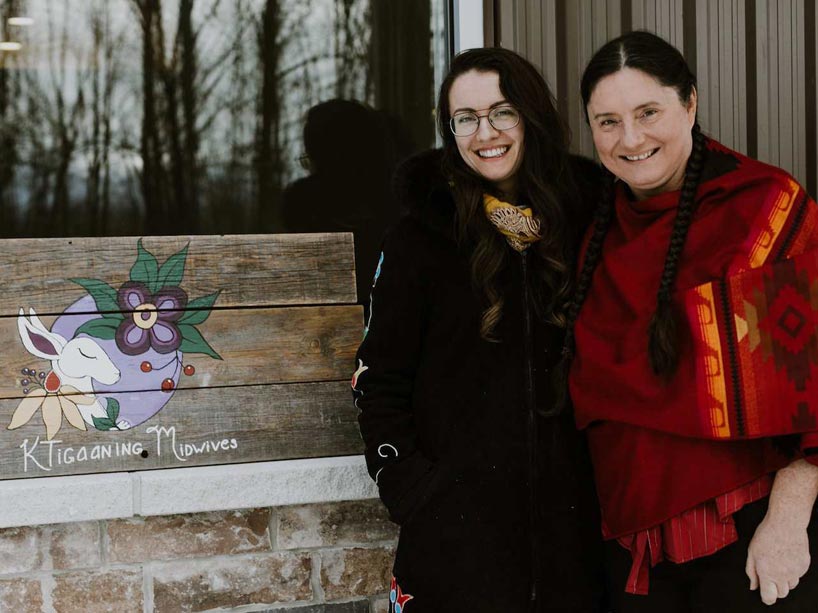Midwives bring birth back to their communities

Carol Couchie and Rachel Dennis are a mother-daughter midwifery team who lead the K’tigaaning midwifery practice near the city of North Bay. Photo provided by Allison Roberts, Dark Woods Photography (external link) .
K’tigaaning (an Anishnaawbemwin word which means “in the garden”) Midwives is a practice outside of North Bay, where a mother-daughter team of Ryerson midwifery graduates have made it their mission to bring birthing back to Indigenous communities as a way to support post-colonial healing.
A graduate from one of Ryerson’s first midwifery classes in 1998, Carol Couchie was Canada’s first registered Indigenous midwife. Her daughter, Rachel Dennis, followed in her footsteps, graduating in 2012. Their desire to bring birthing back to Indigenous communities is rooted in their personal history.
Midwifery is in Couchie’s blood. Her great-grandmother was a midwife – but Couchie never knew that. That knowledge wasn’t passed on, as the trauma and tragedy caused by the forced attendance of residential schools for Indigenous children made it difficult for them to speak about their experience and even their family history. “Our family didn’t talk,” said Couchie. Her father and aunt referred to their experience as “boarding school.” It wasn’t until she attended university that Couchie realized what had happened to her family.
“My world was turned upside down,” said Couchie about the moment she realized her family’s truth. “I felt like I was burning up.” Couchie knew then that she wanted to work in women’s health and particularly in women’s mental health. When she connected midwifery with facilitating bonding between mother and child, she was hooked. Bonding could be a path to healing for her community.
“That’s what called me into midwifery,” she said. “Helping make that connection, that first latch (when a baby starts breastfeeding). I knew I could do that forever.”
Through midwifery, Couchie sought to heal and bring an understanding of the loss of birthing in Indigenous communities. She helped establish the National Aboriginal Council of Midwives to give Indigenous midwifery a united voice across Canada.
“What happened when the midwife left a community?” said Couchie. “Many people don’t understand how important that loss was and the impact it has had.”
Thousands of Indigenous women were forced to leave their communities and their families weeks before the birth of their children to deliver in hospitals that did not necessarily reflect their cultural values and traditions. Generational knowledge around birth and breastfeeding was lost because women were birthing alone.
When Couchie enrolled at Ryerson, Dennis was nine years old. Dennis remembers roaming the halls as a young girl, meeting her mother’s fellow midwifery students, and attending postpartum visits with her mother.
Dennis’s own call to midwifery came as a result of attending a postpartum visit. The new mother was struggling with breastfeeding. Couchie told the new mom that she had brought her daughter along for good luck since she had had no difficulty breastfeeding.
“I didn’t think anything of it at the time,” said Dennis. “But four years later, when my mom was leaving for Manitoba, there was a get-together and this woman approached me with her four-year-old daughter and introduced me by saying “She’s the person that helped you breastfeed.”
And I thought, “If I could impact a person’s life that much just by sitting in a room, imagine what I could do if I am actually helping them.” The gratitude expressed by the mothers Couchie cared for coupled with her own interest in children and babies inspired Dennis to follow a matrilineal midwifery custom and join her mother’s practice.
After Couchie spent time practicing in the remote community of The Pas, Manitoba, she returned to Ontario. She and Dennis established K’tigaaning Midwives in Powassan, near the city of North Bay. When Couchie’s advocacy work takes her away from the practice, Dennis holds down the fort with two other midwives who service the K’tigaaning clientele.
Recently, Dennis received the Iewirokwas Cape Award for Midwives which “honours those midwifery heroes who work quietly within diverse urban, rural, and remote communities across the province and who do so with 'honour, equity, humility, justice, and inclusion.”
Couchie and Dennis now practice midwifery on their ancestral land of Nipissing First Nation.
“It’s pretty special to be able to do this work with my mother and learn from her work and advocacy,” said Dennis. “It feels like there is a strong connection between us and between the land.”